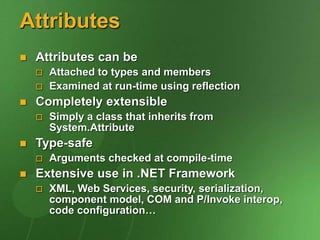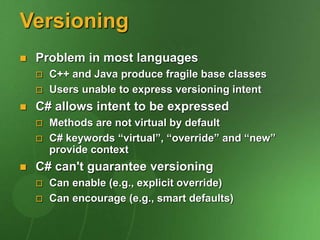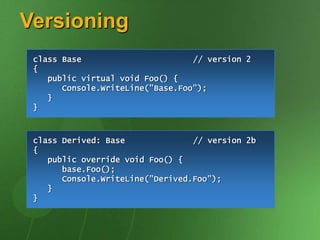Introduction-to-Csharp programacion orientada a objetos
- 1. Introduction to C# Anders Hejlsberg Distinguished Engineer Developer Division Microsoft Corporation
- 2. C# – The Big Ideas The first component oriented language in the C/C++ family Everything really is an object Next generation robust and durable software Preservation of investment
- 3. C# – The Big Ideas A component oriented language C# is the first “component oriented” language in the C/C++ family Component concepts are first class: Properties, methods, events Design-time and run-time attributes Integrated documentation using XML Enables one-stop programming No header files, IDL, etc. Can be embedded in web pages
- 4. C# – The Big Ideas Everything really is an object Traditional views C++, Java: Primitive types are “magic” and do not interoperate with objects Smalltalk, Lisp: Primitive types are objects, but at great performance cost C# unifies with no performance cost Deep simplicity throughout system Improved extensibility and reusability New primitive types: Decimal, SQL… Collections, etc., work for all types
- 5. C# – The Big Ideas Robust and durable software Garbage collection No memory leaks and stray pointers Exceptions Error handling is not an afterthought Type-safety No uninitialized variables, unsafe casts Versioning Pervasive versioning considerations in all aspects of language design
- 6. C# – The Big Ideas Preservation of Investment C++ heritage Namespaces, enums, unsigned types, pointers (in unsafe code), etc. No unnecessary sacrifices Interoperability What software is increasingly about MS C# implementation talks to XML, SOAP, COM, DLLs, and any .NET language Millions of lines of C# code in .NET Short learning curve Increased productivity
- 7. Hello World using System; class Hello { static void Main() { Console.WriteLine("Hello world"); } }
- 8. C# Program Structure Namespaces Contain types and other namespaces Type declarations Classes, structs, interfaces, enums, and delegates Members Constants, fields, methods, properties, indexers, events, operators, constructors, destructors Organization No header files, code written “in-line” No declaration order dependence
- 9. C# Program Structure using System; namespace System.Collections { public class Stack { Entry top; public void Push(object data) { top = new Entry(top, data); } public object Pop() { if (top == null) throw new InvalidOperationException(); object result = top.data; top = top.next; return result; } } }
- 10. Type System Value types Directly contain data Cannot be null Reference types Contain references to objects May be null int i = 123; string s = "Hello world"; 123 i s "Hello world"
- 11. Type System Value types Primitives int i; Enums enum State { Off, On } Structs struct Point { int x, y; } Reference types Classes class Foo: Bar, IFoo {...} Interfaces interface IFoo: IBar {...} Arrays string[] a = new string[10]; Delegates delegate void Empty();
- 12. Predefined Types C# predefined types Reference object, string Signed sbyte, short, int, long Unsigned byte, ushort, uint, ulong Character char Floating-point float, double, decimal Logical bool Predefined types are simply aliases for system-provided types For example, int == System.Int32
- 13. Classes Single inheritance Multiple interface implementation Class members Constants, fields, methods, properties, indexers, events, operators, constructors, destructors Static and instance members Nested types Member access public, protected, internal, private
- 14. Structs Like classes, except Stored in-line, not heap allocated Assignment copies data, not reference No inheritance Ideal for light weight objects Complex, point, rectangle, color int, float, double, etc., are all structs Benefits No heap allocation, less GC pressure More efficient use of memory
- 15. Classes And Structs class CPoint { int x, y; ... } struct SPoint { int x, y; ... } CPoint cp = new CPoint(10, 20); SPoint sp = new SPoint(10, 20); 10 20 sp cp 10 20 CPoint
- 16. Interfaces Multiple inheritance Can contain methods, properties, indexers, and events Private interface implementations interface IDataBound { void Bind(IDataBinder binder); } class EditBox: Control, IDataBound { void IDataBound.Bind(IDataBinder binder) {...} }
- 17. Enums Strongly typed No implicit conversions to/from int Operators: +, -, ++, --, &, |, ^, ~ Can specify underlying type Byte, short, int, long enum Color: byte { Red = 1, Green = 2, Blue = 4, Black = 0, White = Red | Green | Blue, }
- 18. Delegates Object oriented function pointers Multiple receivers Each delegate has an invocation list Thread-safe + and - operations Foundation for events delegate void MouseEvent(int x, int y); delegate double Func(double x); Func func = new Func(Math.Sin); double x = func(1.0);
- 19. Unified Type System Everything is an object All types ultimately inherit from object Any piece of data can be stored, transported, and manipulated with no extra work Stream MemoryStream FileStream Hashtable double int object
- 20. Unified Type System Boxing Allocates box, copies value into it Unboxing Checks type of box, copies value out int i = 123; object o = i; int j = (int)o; 123 i o 123 System.Int32 123 j
- 21. Unified Type System Benefits Eliminates “wrapper classes” Collection classes work with all types Replaces OLE Automation's Variant Lots of examples in .NET Framework string s = string.Format( "Your total was {0} on {1}", total, date); Hashtable t = new Hashtable(); t.Add(0, "zero"); t.Add(1, "one"); t.Add(2, "two");
- 22. Component Development What defines a component? Properties, methods, events Integrated help and documentation Design-time information C# has first class support Not naming patterns, adapters, etc. Not external files Components are easy to build and consume
- 23. Properties Properties are “smart fields” Natural syntax, accessors, inlining public class Button: Control { private string caption; public string Caption { get { return caption; } set { caption = value; Repaint(); } } } Button b = new Button(); b.Caption = "OK"; String s = b.Caption;
- 24. Indexers Indexers are “smart arrays” Can be overloaded public class ListBox: Control { private string[] items; public string this[int index] { get { return items[index]; } set { items[index] = value; Repaint(); } } } ListBox listBox = new ListBox(); listBox[0] = "hello"; Console.WriteLine(listBox[0]);
- 25. Events Sourcing Define the event signature Define the event and firing logic public delegate void EventHandler(object sender, EventArgs e); public class Button { public event EventHandler Click; protected void OnClick(EventArgs e) { if (Click != null) Click(this, e); } }
- 26. Events Handling Define and register event handler public class MyForm: Form { Button okButton; public MyForm() { okButton = new Button(...); okButton.Caption = "OK"; okButton.Click += new EventHandler(OkButtonClick); } void OkButtonClick(object sender, EventArgs e) { ShowMessage("You pressed the OK button"); } }
- 27. Attributes How do you associate information with types and members? Documentation URL for a class Transaction context for a method XML persistence mapping Traditional solutions Add keywords or pragmas to language Use external files, e.g., .IDL, .DEF C# solution: Attributes
- 28. Attributes public class OrderProcessor { [WebMethod] public void SubmitOrder(PurchaseOrder order) {...} } [XmlRoot("Order", Namespace="urn:acme.b2b-schema.v1")] public class PurchaseOrder { [XmlElement("shipTo")] public Address ShipTo; [XmlElement("billTo")] public Address BillTo; [XmlElement("comment")] public string Comment; [XmlElement("items")] public Item[] Items; [XmlAttribute("date")] public DateTime OrderDate; } public class Address {...} public class Item {...}
- 29. Attributes Attributes can be Attached to types and members Examined at run-time using reflection Completely extensible Simply a class that inherits from System.Attribute Type-safe Arguments checked at compile-time Extensive use in .NET Framework XML, Web Services, security, serialization, component model, COM and P/Invoke interop, code configuration…
- 30. XML Comments class XmlElement { /// <summary> /// Returns the attribute with the given name and /// namespace</summary> /// <param name="name"> /// The name of the attribute</param> /// <param name="ns"> /// The namespace of the attribute, or null if /// the attribute has no namespace</param> /// <return> /// The attribute value, or null if the attribute /// does not exist</return> /// <seealso cref="GetAttr(string)"/> /// public string GetAttr(string name, string ns) { ... } }
- 31. Statements And Expressions High C++ fidelity If, while, do require bool condition goto can’t jump into blocks Switch statement No fall-through, “goto case” or “goto default” foreach statement Checked and unchecked statements Expression statements must do work void Foo() { i == 1; // error }
- 32. foreach Statement Iteration of arrays Iteration of user-defined collections foreach (Customer c in customers.OrderBy("name")) { if (c.Orders.Count != 0) { ... } } public static void Main(string[] args) { foreach (string s in args) Console.WriteLine(s); }
- 33. Parameter Arrays Can write “printf” style methods Type-safe, unlike C++ void printf(string fmt, params object[] args) { foreach (object x in args) { ... } } printf("%s %i %i", str, int1, int2); object[] args = new object[3]; args[0] = str; args[1] = int1; Args[2] = int2; printf("%s %i %i", args);
- 34. Operator Overloading First class user-defined data types Used in base class library Decimal, DateTime, TimeSpan Used in UI library Unit, Point, Rectangle Used in SQL integration SQLString, SQLInt16, SQLInt32, SQLInt64, SQLBool, SQLMoney, SQLNumeric, SQLFloat…
- 35. Operator Overloading public struct DBInt { public static readonly DBInt Null = new DBInt(); private int value; private bool defined; public bool IsNull { get { return !defined; } } public static DBInt operator +(DBInt x, DBInt y) {...} public static implicit operator DBInt(int x) {...} public static explicit operator int(DBInt x) {...} } DBInt x = 123; DBInt y = DBInt.Null; DBInt z = x + y;
- 36. Versioning Problem in most languages C++ and Java produce fragile base classes Users unable to express versioning intent C# allows intent to be expressed Methods are not virtual by default C# keywords “virtual”, “override” and “new” provide context C# can't guarantee versioning Can enable (e.g., explicit override) Can encourage (e.g., smart defaults)
- 37. Versioning class Derived: Base // version 1 { public virtual void Foo() { Console.WriteLine("Derived.Foo"); } } class Derived: Base // version 2a { new public virtual void Foo() { Console.WriteLine("Derived.Foo"); } } class Derived: Base // version 2b { public override void Foo() { base.Foo(); Console.WriteLine("Derived.Foo"); } } class Base // version 1 { } class Base // version 2 { public virtual void Foo() { Console.WriteLine("Base.Foo"); } }
- 38. Conditional Compilation #define, #undef #if, #elif, #else, #endif Simple boolean logic Conditional methods public class Debug { [Conditional("Debug")] public static void Assert(bool cond, String s) { if (!cond) { throw new AssertionException(s); } } }
- 39. Unsafe Code Platform interoperability covers most cases Unsafe code Low-level code “within the box” Enables unsafe casts, pointer arithmetic Declarative pinning Fixed statement Basically “inline C” unsafe void Foo() { char* buf = stackalloc char[256]; for (char* p = buf; p < buf + 256; p++) *p = 0; ... }
- 40. Unsafe Code class FileStream: Stream { int handle; public unsafe int Read(byte[] buffer, int index, int count) { int n = 0; fixed (byte* p = buffer) { ReadFile(handle, p + index, count, &n, null); } return n; } [dllimport("kernel32", SetLastError=true)] static extern unsafe bool ReadFile(int hFile, void* lpBuffer, int nBytesToRead, int* nBytesRead, Overlapped* lpOverlapped); }
- 41. More Information http://msdn.microsoft.com/net Download .NET SDK and documentation http://msdn.microsoft.com/events/pdc Slides and info from .NET PDC news://msnews.microsoft.com microsoft.public.dotnet.csharp.general










![Type System
Value types
Primitives int i;
Enums enum State { Off, On }
Structs struct Point { int x, y; }
Reference types
Classes class Foo: Bar, IFoo {...}
Interfaces interface IFoo: IBar {...}
Arrays string[] a = new string[10];
Delegates delegate void Empty();](https://image.slidesharecdn.com/introduction-to-csharp-240617003320-43810408/85/Introduction-to-Csharp-programacion-orientada-a-objetos-11-320.jpg)












![Indexers
Indexers are “smart arrays”
Can be overloaded
public class ListBox: Control
{
private string[] items;
public string this[int index] {
get {
return items[index];
}
set {
items[index] = value;
Repaint();
}
}
}
ListBox listBox = new ListBox();
listBox[0] = "hello";
Console.WriteLine(listBox[0]);](https://image.slidesharecdn.com/introduction-to-csharp-240617003320-43810408/85/Introduction-to-Csharp-programacion-orientada-a-objetos-24-320.jpg)



![Attributes
public class OrderProcessor
{
[WebMethod]
public void SubmitOrder(PurchaseOrder order) {...}
}
[XmlRoot("Order", Namespace="urn:acme.b2b-schema.v1")]
public class PurchaseOrder
{
[XmlElement("shipTo")] public Address ShipTo;
[XmlElement("billTo")] public Address BillTo;
[XmlElement("comment")] public string Comment;
[XmlElement("items")] public Item[] Items;
[XmlAttribute("date")] public DateTime OrderDate;
}
public class Address {...}
public class Item {...}](https://image.slidesharecdn.com/introduction-to-csharp-240617003320-43810408/85/Introduction-to-Csharp-programacion-orientada-a-objetos-28-320.jpg)



![foreach Statement
Iteration of arrays
Iteration of user-defined collections
foreach (Customer c in customers.OrderBy("name")) {
if (c.Orders.Count != 0) {
...
}
}
public static void Main(string[] args) {
foreach (string s in args) Console.WriteLine(s);
}](https://image.slidesharecdn.com/introduction-to-csharp-240617003320-43810408/85/Introduction-to-Csharp-programacion-orientada-a-objetos-32-320.jpg)
![Parameter Arrays
Can write “printf” style methods
Type-safe, unlike C++
void printf(string fmt, params object[] args) {
foreach (object x in args) {
...
}
}
printf("%s %i %i", str, int1, int2);
object[] args = new object[3];
args[0] = str;
args[1] = int1;
Args[2] = int2;
printf("%s %i %i", args);](https://image.slidesharecdn.com/introduction-to-csharp-240617003320-43810408/85/Introduction-to-Csharp-programacion-orientada-a-objetos-33-320.jpg)




![Conditional Compilation
#define, #undef
#if, #elif, #else, #endif
Simple boolean logic
Conditional methods
public class Debug
{
[Conditional("Debug")]
public static void Assert(bool cond, String s) {
if (!cond) {
throw new AssertionException(s);
}
}
}](https://image.slidesharecdn.com/introduction-to-csharp-240617003320-43810408/85/Introduction-to-Csharp-programacion-orientada-a-objetos-38-320.jpg)
![Unsafe Code
Platform interoperability covers most cases
Unsafe code
Low-level code “within the box”
Enables unsafe casts, pointer arithmetic
Declarative pinning
Fixed statement
Basically “inline C”
unsafe void Foo() {
char* buf = stackalloc char[256];
for (char* p = buf; p < buf + 256; p++) *p = 0;
...
}](https://image.slidesharecdn.com/introduction-to-csharp-240617003320-43810408/85/Introduction-to-Csharp-programacion-orientada-a-objetos-39-320.jpg)
![Unsafe Code
class FileStream: Stream
{
int handle;
public unsafe int Read(byte[] buffer, int index, int count) {
int n = 0;
fixed (byte* p = buffer) {
ReadFile(handle, p + index, count, &n, null);
}
return n;
}
[dllimport("kernel32", SetLastError=true)]
static extern unsafe bool ReadFile(int hFile,
void* lpBuffer, int nBytesToRead,
int* nBytesRead, Overlapped* lpOverlapped);
}](https://image.slidesharecdn.com/introduction-to-csharp-240617003320-43810408/85/Introduction-to-Csharp-programacion-orientada-a-objetos-40-320.jpg)
